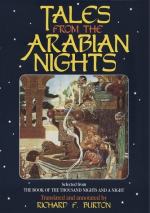It must not be supposed that such literature is purely and simply aphrodisiacal. The learned Sprenger, a physician as well as an Arabist, says (Al-Mas’udi p. 384) of a tractate by the celebrated Rhazes in the Leyden Library, “The number of curious observations, the correct and practical ideas and the novelty of the notions of Eastern nations on these subjects, which are contained in this book, render it one of the most important productions of the medical literature of the Arabs.” I can conscientiously recommend to the Anthropologist a study of the “Kutub al-Bah.”
C.—Pornography.
Here it will be advisable to supplement what was said in my Foreword (p. xiii.) concerning the turpiloquium of The Nights. Readers who have perused the ten volumes will probably agree with me that the naive indecencies of the text are rather gaudis-serie than prurience; and, when delivered with mirth and humour, they are rather the “excrements of wit” than designed for debauching the mind. Crude and indelicate with infantile plainness; even gross and, at times, “nasty” in their terrible frankness, they cannot be accused of corrupting suggestiveness or subtle insinuation of vicious sentiment. Theirs is a coarseness of language, not of idea; they are indecent, not depraved; and the pure and perfect naturalness of their nudity seems almost to purify it, showing that the matter is rather of manners than of morals. Such throughout the East is the language of every man, woman and child, from prince to peasant, from matron to prostitute: all are as the naive French traveller said of the Japanese: “si grossiers qu’ils ne scavent nommer les choses que par leur nom.” This primitive stage of language sufficed to draw from Lane and Burckhardt strictures upon the “most immodest freedom of conversation in Egypt,” where, as all the world over, there are three several stages for names of things and acts sensual. First we have the mot cru, the popular term, soon followed by the technical and scientific, and, lastly, the literary or figurative nomenclature, which is often much more immoral because more attractive, suggestive and seductive than the “raw word.” And let me observe that the highest civilisation is now returning to the language of nature. In La Glu of M. J. Richepin, a triumph of the realistic school, we find such “archaic” expressions as la petee, putain, foutue a la six-quatre-dix; un facetieuse petarade; tu t’es foutue de, etc. Eh vilain bougre! and so forth.[FN#356] To those critics who complain of these raw vulgarisms and puerile indecencies in The Nights I can reply only by quoting the words said to have been said by Dr. Johnson to the lady who complained of the naughty words in his dictionary—“You must have been looking for them, Madam!”




